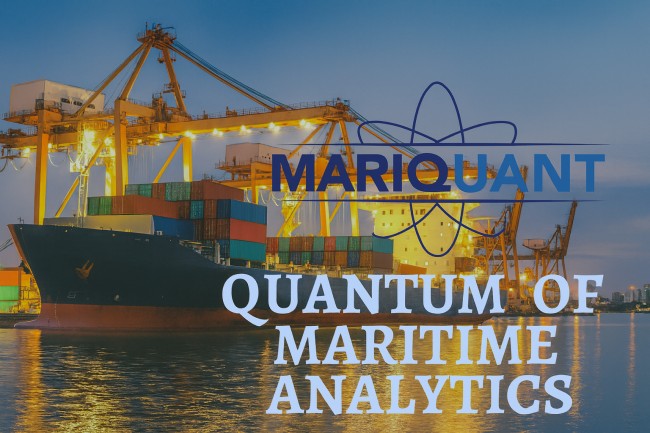Mariquant: Quantum of Maritime Analytics

The maritime industry has always been the backbone of international trade, yet in many respects, it remains one of the least digitised and most complex sectors. Mariquant, often described as the Quantum of Maritime, is a company that aims to change this narrative. Established in 2017, the firm focuses on unlocking the hidden potential of data-driven decision-making within shipping and logistics. By combining expertise in commodities, maritime operations, logistics, financial services, and cutting-edge technology, Mariquant introduces solutions designed to optimise performance and reduce uncertainty in global maritime activities.
The Vision Behind Mariquant
Mariquant was founded with the belief that there is significant untapped value in maritime data. While the industry generates vast amounts of information daily, from vessel movements to port activities, much of it goes underutilised. Mariquant’s vision is to transform this data into actionable intelligence, allowing operators, traders, and service providers to make informed, timely, and commercially sound decisions.
By integrating predictive analytics and machine learning into traditional maritime workflows, Mariquant offers a pathway towards efficiency, accuracy, and scalability. This ambition is neatly summarised in their tagline, Quantum of Maritime, which reflects both the precision and innovation they aspire to bring into the industry.
The Mariquant Analytics Toolbox
At the heart of the company’s offering is the Mariquant Analytics Solution Toolbox, a set of tools created to streamline and enhance maritime decision-making.
Key Features
Calculated ETAs for En-Route Vessels
Predicting the exact time of arrival for vessels is often fraught with uncertainty due to changing weather, port conditions, and logistical disruptions. Mariquant provides advanced ETA predictions by leveraging data-driven models. This allows charterers, port operators, and traders to plan with greater confidence and accuracy.
Port Congestion and Turnaround Reporting
Ports remain one of the most significant bottlenecks in maritime logistics. Mariquant has pioneered a predictive port waiting model that estimates congestion and turnaround times. This tool not only highlights inefficiencies but also enables shipping companies to adjust routes or schedules proactively, minimising costly delays.
Cargo Flow Modelling for Oil and Product Tankers
Global trade in oil and refined products relies heavily on tanker movements. Mariquant’s cargo flow model maps these movements, offering insights into supply chains, demand patterns, and potential disruptions. For stakeholders in commodities trading and energy logistics, such modelling can be invaluable in making market-sensitive decisions.
Technology and Approach
Mariquant employs machine learning techniques and automated data processing to manage and interpret vast datasets. One of their notable achievements involves working with Automatic Identification System (AIS) data. This data, covering thousands of vessels across years of operations, is used to reconstruct sea routes, detect patterns, and classify vessel activities.
Handling AIS Data
AIS signals often suffer from missing values, noise, and inconsistencies. Mariquant addresses these challenges through data-cleaning algorithms and clustering methods. By classifying trajectories into categories such as “loitering”, “anchoring”, or “general voyage”, the company extracts meaningful insights from what might otherwise appear chaotic.
Predictive Analytics in Maritime Operations
The company’s predictive models enable forecasts that go beyond descriptive reporting. From anticipating port delays to modelling oil flows, Mariquant uses advanced algorithms to bridge the gap between raw data and commercial foresight. This application of artificial intelligence ensures that clients are not just reacting to events but anticipating them.
Company Profile
-
Industry: Maritime analytics and predictive analytics
-
Founded: 2017
-
Headquarters: Figueira da Foz, Portugal
-
Specialties: Predictive analytics, maritime data modelling, machine learning solutions for logistics
Despite its small size, the firm brings together a multidisciplinary team. The founders’ combined experience across maritime operations, commodities trading, financial services, and technology development forms the foundation of Mariquant’s innovative approach.
Challenges in the Maritime Analytics Space
While the company has developed pioneering tools, the industry it serves is not without its challenges.
Data Quality and Coverage
AIS data, though invaluable, is prone to gaps and inaccuracies. This demands sophisticated filtering and cleaning before reliable analysis can be achieved.
Scalability
The sheer scale of global maritime operations means that analytics solutions must handle immense amounts of data efficiently. Mariquant has invested in creating scalable systems capable of processing such information.
Adoption in a Traditional Industry
Perhaps the most significant challenge lies in encouraging widespread adoption. The maritime sector is often slow to embrace change, and convincing operators to rely on predictive models instead of traditional practices requires both trust and proven results.
The Current Status of Mariquant
Mariquant continues to be recognised for its innovative approach to maritime analytics. While public information about its latest operations is limited, its vision and contributions remain relevant. Whether through ETA predictions, port congestion models, or cargo flow insights, the company has laid a strong foundation for data-driven transformation in the maritime sector.
Even if operating on a smaller scale, Mariquant’s concept of “Quantum of Maritime” reflects the broader shift towards smarter, technology-driven shipping. As digitalisation advances, the value of their pioneering work is likely to endure.
Conclusion
Mariquant represents a bold step towards harnessing the full potential of maritime data. By offering practical solutions such as ETA predictions, port congestion reporting, and tanker cargo flow models, the company provides tools that can reshape how decisions are made across global shipping.
Although small in size, Mariquant’s vision captures a larger truth: the maritime industry is entering an era where data and analytics are as critical as ships and cargo. Whether Mariquant grows further or inspires others to follow in its wake, it has already contributed to setting a new standard for maritime intelligence.



